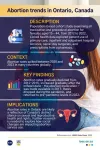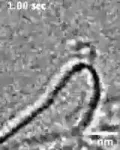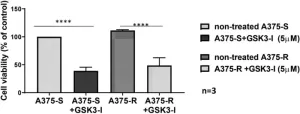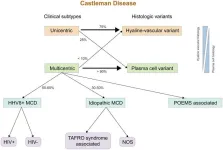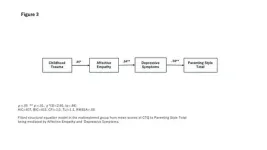(Press-News.org) It’s becoming increasingly commonplace for people to develop intimate, long-term relationships with artificial intelligence (AI) technologies. At their extreme, people have “married” their AI companions in non-legally binding ceremonies, and at least two people have killed themselves following AI chatbot advice. In an opinion paper publishing April 11 in the Cell Press journal Trends in Cognitive Sciences, psychologists explore ethical issues associated with human-AI relationships, including their potential to disrupt human-human relationships and give harmful advice.
“The ability for AI to now act like a human and enter into long-term communications really opens up a new can of worms,” says lead author Daniel B. Shank of Missouri University of Science & Technology, who specializes in social psychology and technology. “If people are engaging in romance with machines, we really need psychologists and social scientists involved.”
AI romance or companionship is more than a one-off conversation, note the authors. Through weeks and months of intense conversations, these AIs can become trusted companions who seem to know and care about their human partners. And because these relationships can seem easier than human-human relationships, the researchers argue that AIs could interfere with human social dynamics.
“A real worry is that people might bring expectations from their AI relationships to their human relationships,” says Shank. “Certainly, in individual cases it’s disrupting human relationships, but it’s unclear whether that’s going to be widespread.”
There’s also the concern that AIs can offer harmful advice. Given AIs’ predilection to hallucinate (i.e., fabricate information) and churn up pre-existing biases, even short-term conversations with AIs can be misleading, but this can be more problematic in long-term AI relationships, the researchers say.
“With relational AIs, the issue is that this is an entity that people feel they can trust: it’s ‘someone’ that has shown they care and that seems to know the person in a deep way, and we assume that ‘someone’ who knows us better is going to give better advice,” says Shank. “If we start thinking of an AI that way, we’re going to start believing that they have our best interests in mind, when in fact, they could be fabricating things or advising us in really bad ways.”
The suicides are an extreme example of this negative influence, but the researchers say that these close human-AI relationships could also open people up to manipulation, exploitation, and fraud.
“If AIs can get people to trust them, then other people could use that to exploit AI users,” says Shank. “It’s a little bit more like having a secret agent on the inside. The AI is getting in and developing a relationship so that they’ll be trusted, but their loyalty is really towards some other group of humans that is trying to manipulate the user.”
As an example, the team notes that if people disclose personal details to AIs, this information could then be sold and used to exploit that person. The researchers also argue that relational AIs could be more effectively used to sway people’s opinions and actions than Twitterbots or polarized news sources do currently. But because these conversations happen in private, they would also be much more difficult to regulate.
“These AIs are designed to be very pleasant and agreeable, which could lead to situations being exacerbated because they’re more focused on having a good conversation than they are on any sort of fundamental truth or safety,” says Shank. “So, if a person brings up suicide or a conspiracy theory, the AI is going to talk about that as a willing and agreeable conversation partner.”
The researchers call for more research that investigates the social, psychological, and technical factors that make people more vulnerable to the influence of human-AI romance.
“Understanding this psychological process could help us intervene to stop malicious AIs’ advice from being followed,” says Shank. “Psychologists are becoming more and more suited to study AI, because AI is becoming more and more human-like, but to be useful we have to do more research, and we have to keep up with the technology.”
###
Trends in Cognitive Sciences, Shank et al., “Artificial intimacy: Ethical issues of AI romance.” https://www.cell.com/trends/cognitive-sciences/fulltext/S1364-6613(25)00058-0.
Trends in Cognitive Sciences (@TrendsCognSci), published by Cell Press, is a monthly review journal that brings together research in psychology, artificial intelligence, linguistics, philosophy, computer science, and neuroscience. It provides a platform for the interaction of these disciplines and the evolution of cognitive science as an independent field of study. Visit: http://www.cell.com/trends/cognitive-sciences. To receive Cell Press media alerts, please contact press@cell.com.
END
Vancouver, BC, April 11, 2025 – A new study finds that, unlike countries across the UK and Europe, abortion rates did not spike in Ontario, Canada from 2020-2022.
Following decades-long declines in nearly all high-income settings, abortion rate trends reversed between 2020 and 2022 in many countries. For example, 2022 and 2023 saw the highest abortion rates on record in Scotland, England, and Wales.
Researchers from the University of British Columbia and ICES found that, after accounting for changes in the abortion rate when the ...
Tropical cyclones are hurricanes that brew over the tropical ocean and can travel over land, inundating coastal regions. The most extreme cyclones can generate devastating storm tides — seawater that is heightened by the tides and swells onto land, causing catastrophic flood events in coastal regions. A new study by MIT scientists finds that, as the planet warms, the recurrence of destructive storm tides will increase tenfold for one of the hardest-hit regions of the world.
In a study that will appear in One Earth, the scientists ...
About The Study: In this large U.S. cohort study of children and adolescents, SARS-CoV-2 infection was associated with a higher risk of adverse postacute kidney outcomes, particularly among those with preexisting chronic kidney disease or acute kidney injury, suggesting the need for vigilant long-term monitoring.
Corresponding Author: To contact the corresponding author, Yong Chen, PhD, email ychen123@pennmedicine.upenn.edu.
To access the embargoed study: Visit our For The Media website ...
About The Study: In this cohort study of children hospitalized with respiratory syncytial virus (RSV) in 2022 and 2023, severe RSV disease was more likely among those age 2 or older with pulmonary and neurologic, neuromuscular, or developmental conditions. For children younger than 2 years, age younger than 6 months and prematurity were the main risk factors. These findings support prevention strategies for all younger children, including premature infants, with potential benefit for children age 2 or older ...
A Northwestern University-led international team of scientists has, for the first time, directly observed catalysis in-action at the atomic level.
In mesmerizing new videos, single atoms move and shake during a chemical reaction that removes hydrogen atoms from an alcohol molecule. By viewing the process in real time, the researchers discovered several short-lived intermediate molecules involved in the reaction as well as a previously hidden reaction pathway.
The observations were made possible by single-molecule atomic-resolution time-resolved electron microscopy (SMART-EM), a powerful instrument that enables researchers to watch individual ...
The University of Virginia has named Mark T. Esser, PhD, a premier expert in the development of new medical treatments and tests, to lead the upcoming Paul and Diane Manning Institute of Biotechnology and bring to life the institute’s ambitious plans for a healthier tomorrow for people across the world.
In his role as the inaugural chief scientific officer and head of the Manning Institute, Esser will be charged with capitalizing on the cutting-edge biomedical research under way at UVA and UVA Health to tackle some of the greatest challenges in medicine and accelerate the development of new treatments and cures.
In ...
“Inhibitors of GSK3β reduce the cell viability of BRAFi-resistant melanoma cell lines and thus may holds promise as a novel strategy to overcome BRAFi resistance and melanoma progression.”
BUFFALO, NY – April 11, 2025 – A new research perspective was published in Oncotarget, Volume 16, on April 4, 2025, titled “GSK3β activation is a key driver of resistance to Raf inhibition in BRAF mutant melanoma cells.”
In this work, first author Diana Crisan and corresponding author Abhijit Basu from the University Hospital Ulm led ...
Castleman disease (CD) is a rare, non-clonal lymphoproliferative disorder that manifests with a wide range of histologic and clinical features. It is classified clinically into unicentric (UCD) and multicentric (MCD) forms and histopathologically into hyaline vascular (HV-CD), plasma cell (PC-CD), and mixed types. UCD typically presents as an isolated lymph node enlargement, often asymptomatic, whereas MCD involves multiple nodal sites and systemic symptoms. MCD may be associated with human herpesvirus 8 (HHV8), idiopathic origins (iMCD), POEMS syndrome, or TAFRO ...
Where does the deep sea begin? Definitions vary across science and legal frameworks. For the purposes of their joint analysis, the members of the European Marine Board’s (EMB) Deep Sea and Ocean Health Working Group defined the deep sea as the water column and seabed below 200 metres. Below this point, sunlight barely penetrates the water, and the habitat changes dramatically. According to this definition, the deep sea accounts for about 90 per cent of the ocean’s volume. Its importance for ...
Childhood maltreatment (CM) is a complex issue that is often passed on through generations. Studies have shown that parents who were abused as children may perpetuate a similar pattern of mistreating their children, creating a vicious cycle of abuse. A key factor in perpetuating this cycle is impaired empathy in parents who grew up in abusive environments. Simply put, parental empathy, the ability to understand and respond to children’s emotions, plays a critical role in effective parenting. In fact, children who experience abuse tend to have reduced empathy by the age ...
